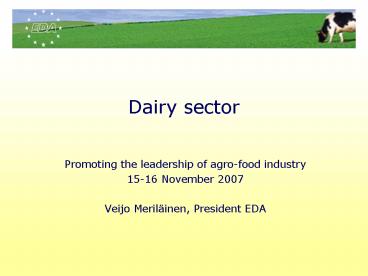Dairy sector - PowerPoint PPT Presentation
1 / 14
Title:
Dairy sector
Description:
... cows per holding. 1 168 000. 6 500. Holdings with dairy ... Number of dairy cows. 1 133. 4 492. Milk collection 1000 tn. 5 833. 4 627. Milk production 1000 tn ... – PowerPoint PPT presentation
Number of Views:77
Avg rating:3.0/5.0
Title: Dairy sector
1
Dairy sector
- Promoting the leadership of agro-food industry
- 15-16 November 2007
- Veijo Meriläinen, President EDA
2
Contents
- Dairy sectors societal relevance
- Global perspective
- Dairy sector in EU
- EU Dairy vision
- Challenges facing the dairy sector
- Raw material
- Better regulation and simplification
- Route to market
- Innovations
- Concluding statement
3
1. Dairy sectors Societal Relevance
- The dairy sector is fundamental for the quality
of life in Europe - Contribution to health, responsible and safe
nutrition for consumers - Economic importance for rural development and
environmental sustainability
4
2. Global perspective
- Total world cow milk production is 550 mln tonnes
- EU is the worlds number one cow milk producer
with 142 mln tonnes, far ahead of US ( 80 mln
tonnes) and India (38 mln tonnes) - Milk production is growing in China, India, US
and South-America, EU is lagging behind - Since 2003 global demand has outstripped supply
and the stocks have been cleared. Today demand is
definitely greater than supply! - Only 7-8 is traded globally. EU has lost its
share and New Zealand is now the biggest exporter
5
3. Dairy sector in EU - characteristics
- EU milk production is highly clustered 6 member
states (Germany, France, UK, Netherlands, Italy
and Poland) contribute together more than 70 of
the cows milk collected in EU - The dairy industry represents around 15 (EUR 117
billion) of the turnover of food and drinks
industry in Europe - EU dairy industry in general is basically
national and the structure is fragmented - Local SMEs are in a significant role only a
few companies position themselves as global and
pan-european - Co-operatives and private enterprises have
different approaches concerning expansion and
milk procurement - Example of the versatility in the next slide
6
Countries are different Example of versatility
Romania
Denmark
5 833
4 627
Milk production 1000 tn
1 133
4 492
Milk collection 1000 tn
19
97
1 626 000
558 000
Number of dairy cows
1 168 000
6 500
Holdings with dairy cows
1,4
85,7
Average number of cows per holding
3 600
8 300
Milk yield per cow
361
67
Number of processing plants
19,0
30,4
Milk price /100 kg
SourceEurostat
7
4. EU Dairy strategy
- Dynamic
- Innovative
- Global player
- Healthy nutrition
- Sustainable
- Competitive
8
5. Challenges within the dairy sectorAccess to
raw material is key to global position
- Milk production is highly regulated by quotas and
mobility of raw material is difficult - Raw milk is perishable and cant be transported
long distances - Milk production is challenging no compromises on
food safety, labour intensive and milk is
collected daily - Seasonality of production leads to overcapacity
- Requires long term investments on farm and
industry level - Competitiveness of the dairy processors is
increasingly decisive for the pricing of raw
material milk to farmers
9
5. Challenges within the dairy sector Better
regulation and simplification
- Flaws are identified, but results are not
satisfactory - Slow decision-making process
- Lack of predictability
- Horizontal regulations concerning feed, hygiene,
claims and labelling - New regulations for animal welfare and quality
labelling? - Milk specific regulation drinking milk, spreads
and preserved milk
10
5. Challenges within the dairy sector Route to
market Access to world market
- Global players include different geographical
regions in their business strategies, but SMEs
have difficulties in approach. Specific support
mechanisms could be helpful - Industrial policy is made too much on terms of
agricultural policy - Technical and sanitary measures are barriers to
trade animal disease outbreaks, divergent
analysis and sampling methods, zero tolerances,
milk products and animal health standards
11
5. Challenges within the dairy sector Route to
market Access to consumer
- Negotiation power
- Private certifications and standards
- Trade terms and conditions
- Private label
Source Food Engineering Ingredients, RLF,
Planetretail
12
5. Challenges within the dairy sectorInnovations
- Innovations have been and are essential in
improving the global competitiveness of dairy
industry and creating value added products - Innovations in the future are more and more
linked to the health and well-being of consumers.
This means that more scientific evidence is
needed for marketing of these products - EU should create and improve platforms to support
such development in research. The Technology
Platform on food research, called Food for Life
is a good example of such development and
creating science based innovations - Claims are essential and needed for marketing and
consumer communication of these new products.
This means that approval of claims should not
prevent or slowdown this development - European level programs in science and research
(7th framework program) are essential in boosting
the science-based innovations in open
environment. Probiotic dairy products are good
examples of commercial success in this area - SMEs should have easier access to these programs
13
6. Concluding statement
- EU dairy industry is world class
- Efficient processing plants
- International brands
- Superior product quality
- But also a market that needs rules higher
efficiency in EU policy framework needed. - EU dairy competitiveness can be further enhanced
if EU policy together with the industry addresses
the challenges ahead.
14
Thank you!
- Promoting the leadership of agro-food industry
- 15-16 November 2007
- Veijo Meriläinen, President EDA

